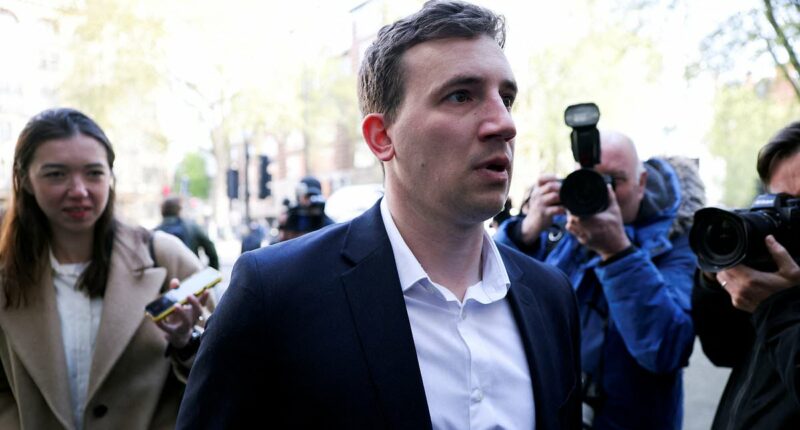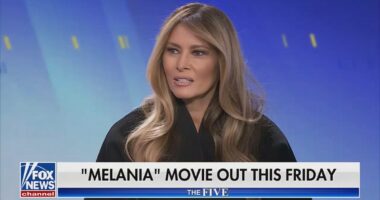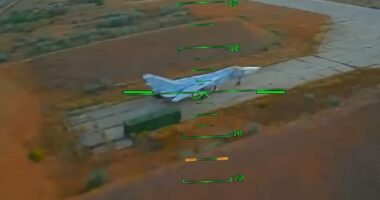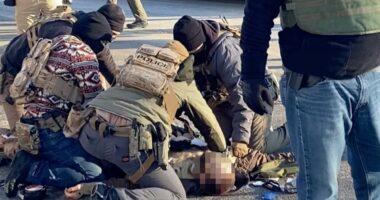Share this @internewscast.com
Sir Keir Starmer is under scrutiny regarding his government’s involvement in the failed trial concerning allegations that a parliamentary assistant engaged in espionage for China.
Christopher Cash, 30, from Whitechapel, east London, and teacher Christopher Berry, 33, of Witney, Oxfordshire, faced charges of spying under the Official Secrets Act.
They were set to face trial in October, but proceedings against them were stopped on Monday, sparking criticism from Downing Street and MPs.
The pair were accused of passing information about the Government’s foreign policy to a high-ranking member of the Chinese government.
While Sir Keir Starmer’s spokesperson initially labeled the trial’s collapse as ‘extremely disappointing’, recent revelations suggest that top Whitehall officials allegedly convened to discuss the proceedings and China’s representation.
The reported meeting included Jonathan Powell, the UK’s national security adviser, and Sir Oliver Robbins, the permanent secretary at the Foreign Office.
The Sunday Times reported that Powell informed the meeting attendees that Matthew Collins, the deputy national security adviser prepared to testify for the prosecution, would not label China as an enemy but as a ‘challenge’.
This term has its roots in the National Security Strategy 2025 report, a document that sets out the major security risks the UK faces.
Nevertheless, a Cabinet Office spokesperson told the Mail: ‘This is completely false. There has been no material change provided by the government, nor were any witnesses restricted in the sources on which they could base their evidence.’
This limitation presented a severe problem for the trial, as prosecutions under the Official Secrets Act require proof that defendants acted in the interests of an enemy.

Parliamentary aide Christopher Cash, 30, (pictured above in April arriving at Westminster Magistrates Court) and British teacher Christopher Berry, 33, were each charged with the offence of spying under the Official Secrets Act

They were set to face trial in October, but proceedings against them were stopped on Monday, sparking criticism from Downing Street and MPs. Pictured: Christopher Berry (right)
Though it isn’t clear who exactly made the decision to limit what Collins could say, witnesses were reportedly told it came from ‘the very top’, a claim that the Cabinet Office said last night was ‘completely false’.
The Crown Prosecution Service (CPS) was under the impression that a senior civil servant would give evidence to establish that Beijing was an enemy of Britain, which was needed for a successful prosecution, following previous assurances from the Conservative government.
There were also plans in place for intelligence officials to testify in a closed court to protect their identity.
However, prosecutors were told that Labour ministers were no longer willing to describe China as an enemy in court, causing the case to collapse.
Last month, Dan Jarvis, the Labour security minister, told Parliament the decision to drop the case was ‘independent’ from the government and it was ‘not for any government minister to speculate on the reasons behind it’.
Speaking to The Times, Commons Speaker Sir Lindsay Hoyle said the decision effectively gave Beijing ‘licence to operate’ within Parliament, after the men were alleged to have targeted the China Research Group of MPs.
The official who commissioned the research has since been named in media reports as Cai Qi, a senior aide to Xi Jinping, the Chinese president.
Mr Cash and Mr Berry have denied any wrongdoing. Mr Cash’s lawyer has said his client is ‘entirely innocent and should never have been arrested, let alone charged’.

Speaking to The Times, Commons Speaker Sir Lindsay Hoyle said the decision effectively gave Beijing ‘licence to operate’ within Parliament, after the men were alleged to have targeted the China Research Group of MPs

A meeting involving top Whitehall officials allegedly concluded that China would not be described as an ‘enemy’ (pictured: Chinese President Xi Jinping)
Sir Lindsay, the director of public prosecutions said there was no ‘outside pressure’ influence the decision to drop the charges.
‘As Speaker, I take the security of this house incredibly seriously. I believe this leaves the door open to foreign actors trying to spy on the House,’ Sir Lindsay said.
‘This door must be closed hard. We must pursue all avenues to ensure the protection of members and people that work within the House of Commons. It will not be tolerated.’
A Cabinet Office spokesperson told the Daily Mail of the Sunday Times report: ‘This story is full of fundamental inaccuracies. The decision not to proceed with prosecution under the Official Secrets Act was made by the Crown Prosecution Service entirely independently of government.
‘There has not been a material change in the evidence provided by the government. As a matter of fact, any evidence submitted for this case can only be from the time that the alleged offences took place (2021-2023), rendering the National Security Strategy 2025 unrelated.’

















